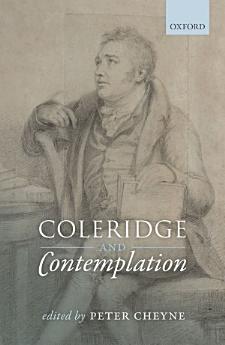Coleridge and Contemplation
Peter Cheyne
ກ.ລ. 2017 · Oxford University Press
ປຶ້ມອີບຸກ
352
ໜ້າ
family_home
ມີສິດ
info
reportບໍ່ໄດ້ຢັ້ງຢືນການຈັດອັນດັບ ແລະ ຄຳຕິຊົມ ສຶກສາເພີ່ມເຕີມ
ກ່ຽວກັບປຶ້ມ e-book ນີ້
Coleridge and Contemplation is a multi-disciplinary volume on Samuel Taylor Coleridge, founding poet of British Romanticism, critic, and author of philosophical, political, and theological works. In his philosophical writings, Coleridge developed his thinking about the symbolizing imagination, a precursor to contemplation, into a theory of contemplation itself, which for him occurs in its purest form as a manifestation of 'Reason'. Coleridge is a particularly challenging figure because he was a thinker in process, and something of an omnimath, a Renaissance man of the Romantic era. The dynamic quality of his thinking, the 'dark fluxion' pursued but ultimately 'unfixable by thought', and his extensive range of interests make a philosophical yet also multi-disciplinary approach to Coleridge essential. This book is the first collection to feature philosophers and intellectual historians writing on Coleridge's philosophy. This volume opens up a neglected aspect of the work of Britain's greatest philosopher-poet — his analysis of contemplation, which he considered the highest of human mental powers. Philosophers including Roger Scruton, David E. Cooper, Michael McGhee, Andy Hamilton, and Peter Cheyne contribute original essays on the philosophical, literary, and political implications of Coleridge's views. The volume is edited and introduced by Peter Cheyne, and Baroness Mary Warnock contributes a foreword. The chapters by philosophers are supported by new developments in philosophically minded criticism from leading Coleridge scholars in English departments, including Jim Mays, Kathleen Wheeler, and James Engell. They approach Coleridge as an energetic yet contemplative thinker concerned with the intuition of ideas and the processes of cultivation in self and society. Other chapters, from intellectual historians and theologians, including Douglas Hedley clarify the historical background, and 'religious musings', of Coleridge's thought regarding contemplation.
ກ່ຽວກັບຜູ້ຂຽນ
Peter Cheyne is Associate Professor at Shimane University, where he teaches Philosophy and Literature. He divides his time between Shimane and his native Durham, where he is Visiting Fellow at Durham University Philosophy Department. He has published 'A Coleridgean Account of Meditative Experience' (Journal of Philosophy of Life, Jan. 2013); 'The Art Of Poetic Life-Writing' (Coleridge Bulletin, Winter 2014); 'Encoded and Embodied Rhythm', (eds Hamilton & Paddington, Philosophy of Rhythm, OUP, 2017).
ໃຫ້ຄະແນນ e-book ນີ້
ບອກພວກເຮົາວ່າທ່ານຄິດແນວໃດ.
ອ່ານຂໍ້ມູນຂ່າວສານ
ສະມາດໂຟນ ແລະ ແທັບເລັດ
ຕິດຕັ້ງ ແອັບ Google Play Books ສຳລັບ Android ແລະ iPad/iPhone. ມັນຊິ້ງຂໍ້ມູນໂດຍອັດຕະໂນມັດກັບບັນຊີຂອງທ່ານ ແລະ ອະນຸຍາດໃຫ້ທ່ານອ່ານທາງອອນລາຍ ຫຼື ແບບອອບລາຍໄດ້ ບໍ່ວ່າທ່ານຈະຢູ່ໃສ.
ແລັບທັອບ ແລະ ຄອມພິວເຕີ
ທ່ານສາມາດຟັງປຶ້ມສຽງທີ່ຊື້ໃນ Google Play ໂດຍໃຊ້ໂປຣແກຣມທ່ອງເວັບຂອງຄອມພິວເຕີຂອງທ່ານໄດ້.
eReaders ແລະອຸປະກອນອື່ນໆ
ເພື່ອອ່ານໃນອຸປະກອນ e-ink ເຊັ່ນ: Kobo eReader, ທ່ານຈຳເປັນຕ້ອງດາວໂຫຼດໄຟລ໌ ແລະ ໂອນຍ້າຍມັນໄປໃສ່ອຸປະກອນຂອງທ່ານກ່ອນ. ປະຕິບັດຕາມຄຳແນະນຳລະອຽດຂອງ ສູນຊ່ວຍເຫຼືອ ເພື່ອໂອນຍ້າຍໄຟລ໌ໄໃສ່ eReader ທີ່ຮອງຮັບ.







